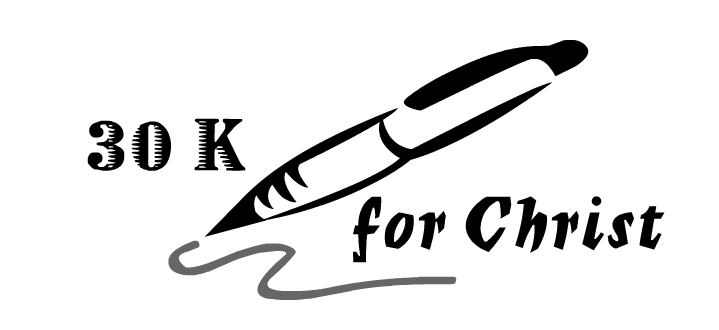As we embark upon Holy Week, we are also opening a month of writing dedicated to our Lord.

A few years ago, when National Novel Writing Month was just a November event, several of us on the Guild got to talking about how it didn’t fit our needs. Some of us wrote non-fiction; others short stories. While we loved the idea of a word-count challenge, but we wanted something that would address all of us–and our role as Catholic Writers.
30K for Christ was born.
The challenge is simple: Write 30,000 words in the month of April. They can be blogs, articles, stories, novels. They can be a combination. They do not have to be nonfiction or even spiritual. (I will be working on my next DragonEye, PI fantasy, Gapman.) However, for those words to count in the challenge, you must dedicate them to Christ.
How? By prayer, by subject matter, by the conscious effort to reflect His will and not our own.
This year, we have a wonderful advantage over the past–we have the blog where we can invite others not in the Guild to join us, and where we can post thought-provoking articles about what it means to be a Catholic writer. In addition to posts by Joe Wetterling on The Baptized Imagination, we are posting the transcript from Barbara Nicolosi’s chat, “Toward a Literature Which is Catholic.” We are dedicating at least Thursdays to such posts, and to inviting folks to post their word count in the comment section.
Participation is easy: If you are a CWG member, we invite you to post your intentions in the forums: (http://catholicwritersguild.com/index.php?name=Forums&file=viewforum&f=84). We have threads for word count, excerpts to share, questions and calls for help. If you are not a member, now is a great time to join the CWG.
Member or not, you are invited to join with us on the blog. Say hello today, and then share progress on Thursdays.
We hope that by making a conscious effort with your blogging, you will develop a habit to invite Him in all your writing efforts. The Lord created us with a wonderful gift. It is our privilege and obligation to thank him by using it in his service.
God bless you, and Happy Writing!
-Karina
***
#30K4JC – Twitterati Edition:
Want to keep up with 30K for Christ on Twitter? Use #30K4JC (not case-sensitive) in your updates! Let’s cheer each other on!
Still not sure what that means? Here’s a sample tweet that may or may not be based on life experience:
Despite the 16mo strewing toilet paper all through the house w/ his sister cheering, I logged 1K today for #30K4JC
Share your writing goals, your word count, or your particular challenges. Encourage others, be encouraged, and laugh a bit.
Hey, doesn’t #30K4JC entitle me to an extra pot of coffee? No? Well. Guess I’d better get writing.
Have questions? Feel free to contact Sarah Reinhard, @peerybingle on Twitter.




